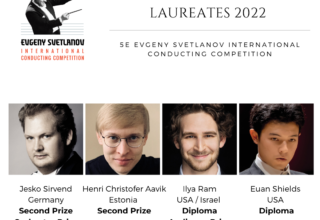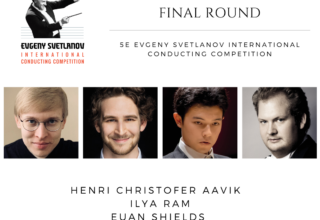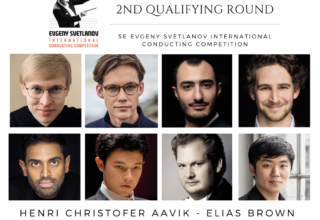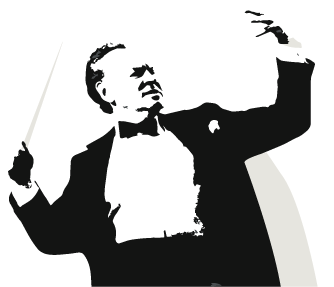International Herald Tribune, January, the 5th, 2000
By George W. Loomis
A Return to the Bolshoi
Svetlanov Conducts a Dark, Powerful ‘Maid of Pskov’ MOSCOW — The Bolshoi Theater welcomed the conductor Yevgeni Svetlanov back to the fold with a new production of Rimsky-Korsakov’s “The Maid of Pskov,” the opera he led at his debut there in 1955. The event was a bright feather in the cap of the Bolshoi’s artistic director, Viadimir Vasiliev, who gave the conductor carte blanche for most aspects of the production. And the theater had an air of excitement that comes to an opera house only when a renowned conductor is making a debut or rare appearance.
Svetlanov’s return to the Bolshoi, where he was chief conductor in the early 1960s but where he has not led an opera for more than a decade, marked a departure from the busy orchestral schedule he has pursued of late. But his decision was not without repercussions. His announcement that his work at the Bolshoi would be part of a seven-month sabbatical from the State Symphony Orchestra of Russia soon had the players grumbling that they were leaderless and losing valuable concert opportunities abroad. The dissidents actually filed a petition with the minister of culture demanding that Svetlanov be replaced as conductor. Ousting him from the orchestra he has led since 1965 is sure to be an uphill battle. But the controversy points up the pressures on Russia’s musical leaders to attract hard currency and even adopt entrepreneurial skills. At 71, Svetlanov seems to have little appetite for that sort of thing, preferring to devote his energies to such challenges of a musical nature as strike his fancy. As the musical director of orchestras in the Hague and Stockholm, as well as the State Symphony Orchestra, and with frequent engagements in London and Paris, there seems to be no shortage of opportunities.
At any rate, the short-term beneficiary is clearly the Bolshoi. Here was the company at close to its considerable best, offering opera that was direct in approach, powerful in impact and vast in scope. The dark, soul-baring sonorities Svetlanov drew from the orchestra’s strings, along with super-charged brass playing, made the opera’s extended orchestral moments — including the Berlioz-inspired royal hunt and storm — especially memorable. Svetlanov established a strong rhythmic underpinning that was crucial in bringing to life this opera about Ivan the Terrible and the uncharacteristic magnanimity he showed the city of Pskov during his ruthless campaign to unify Russia.
Rimsky-Korsakov’s concern for realism in “The Maid of Pskov” led him to avoid traditional arias and duets in favor of a more continuous fabric — always the more challenging approach for an opera composer. The opera has longueurs that even Svetlanov couldn’t conceal. But much of the music is gorgeous, and the great crowd scene at the end of the first act, in which different factions of Pskov’s populace react to Ivan’s impending arrival, came off especially well thanks to the Bolshoi’s superb chorus.
“The Maid of Pskov,” which was played in the composer’s second revised version from the 1890s, is sometimes compared adversely to “Boris Godunov” because Ivan is psychologically less complex than Mussorgsky’s czar. But Rimsky’s drama afforded no similar opportunity for detailed character study.
His Ivan has a tender side, but the singer’s main challenge is to project a formidable image. Unfortunately, the bass Vyacheslav Pochapsky lacked the sheer vocal power to do so. But Maria Gavrilova’s beaming radiance of voice made her a fine choice for the title role of Olga, the czar’s lost love-child responsible for his show of mercy. As her lover, Tucha, the tenor Pavel Kudryavchenko displayed fine, ringing tones, and Leonid Zimnenko brought sonorous richness to the other principal bass role, Prince Tomakov, the local governor who raised Olga as his own daughter.
Svetlanov’s band-picked producer, Joachim Sharoyev in his Bolshoi debut, gave the opera a look that was grandly conventional even by the Bolshoi’s tradition-minded standards. For anyone familiar with Russian production styles, the opulent sets and costumes by Sergei Barkhin and Tatiana Barkhma, respectively, bad the distinct look of déjà vu, right from the moment the curtain went up on a painted backdrop showing Pskov’s river-based fortresses. In a world where the operatic product is becoming increasingly homogeneous, it may be comforting to know that the Bolshoi continues along a course all its own.
George W. Loomis is a music writer based in Moscow.




